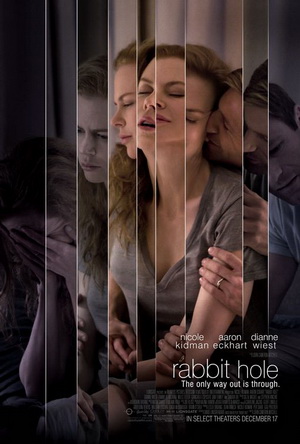It looks like Nicole Kidman has found her groove again.
After a string of mediocre films (including Nine, Australia, The Golden Compass and The Invasion), the once adept Australian actress has found another award-winning performance as Becca in Rabbit Hole, a story about a married couple who have lost their son.
While the plot is simple, the emotions that it deals with certainly are not. The film skillfully captures the pain that lingers long after the funeral is over and the slow dissolution of a marriage caused by the death of a child. On one level, Rabbit Hole is about people trying to get over a tragedy. On another level it is about forgiving and healing, and not letting the misery stop them from living their lives. However, the journey to peace is not easy, and while both of them want to desperately get “better,”neither of them know how to.
Based on the Pulitzer prize-winning play of the same name by David Lindsay-Abaire, Nicole Kidman and Aaron Eckhart play Becca and Howie Corbett respectively, a once happy, upper-middle class family who live a typical, sheltered life in suburban New York. The first scene of the movie shows Becca planting flowers in her garden. While everything looks at first glance to be serenely normal (yet somehow oddly restricting), we soon find out what’s been eating away at the Corbetts – they have lost their son, Danny, eight months ago when he ran out onto the road while chasing their dog and got hit by a car.

The couple is polarized by the different ways that they cope with their grief. Becca becomes bitter and angry about the death of her son, while Howie prefers to live in the memories of Danny. Howie wants to attend grief-support groups while Becca can’t stand them talking about “God’s Plan”, admonishing the people there and angrily asking why God can’t make “another angel” for them. Becca wants to sell the house and give away Danny’s old toys while Howie can’t bring himself to delete a video clip of him on his phone, repeatedly watching it everyday. There is virtually no intimacy between the two anymore, driving a further wedge between them.
Each of them find some solace in different places. Howie becomes attracted to Gaby (Sandra Oh), a fellow grief-support group member and starts to spend time with her, smoking pot in her car and going to the arcade to escape from reality. Becca’s catharsis is in the form of the teenaged Jason (Miles Teller), the driver of the car that killed her son. This may seem strange yet one can see that their tentative friendship with one another is therapeutic for both parties. Jason is able to tell Becca about the guilt he’s feeling and inner turmoil over what he has done. Becca finds comfort in Jason’s comic book about parallel universes, saying that she likes the idea that “somewhere out there I’m having a good time.”
I’d like to bring this back to Kidman’s performance, which is superbly versatile. She is able to capture all the pent up anger and sadness of a bereaved mother in a nuanced and understated way, playing the woman who is trying to keep it all together to perfection. Kidman could have very easily crossed the line into absurdly melodramatic, but she doesn’t, and for that we can all sigh a breath of relief. We see her devastation when Becca’s irresponsible little sister, Izzy (Tammy Blanchard) becomes pregnant. We see her irritation with her mother, Nat (Dianne Wiest) when she continually compares Danny to her own dead son, who she lost years ago because of drugs. One scene that stands out in particular that showcases the stunning performance of Kidman is when Becca is in a grocery store and witnesses a mother refusing to buy candy for her child. Becca scolds the mother for not trying to make her son happy and the mother cruelly shoots back that Becca is obviously not a mother. The shock quickly evolves into distress and then anger, which reflects Kidman’s flexibility in its entirety. That scene alone made the film for me.
Even though Rabbit Hole may seem like an entirely depressing film, it’s not all sadness and grief. Director John Cameron Mitchell is conscious of the subtle shades of sorrow but is also able to inject liveliness and laughter into the film. His camera work is unobtrusive and simple, just like the plot. By not interfering too much with the editing, Mitchell is able to let the performances of his actors propel his film and guide us to the satisfying, if not happy, ending.
Rabbit Hole is not an easy film to watch, but its realistic depiction of grief is certainly appreciated. It doesn’t try to soften the blow of the effects of death, and we, as the viewer wouldn’t want anything else. It would do a disservice to us all if the movie tried anything different.
Beautifully mesmerizing and realistic in its depiction of grief, Rabbit Hole is heart aching in the best possible way. Despite Nicole Kidman’s somewhat botox-ed face, she manages to pull off a great performance that is definitely worth watching as well: A
